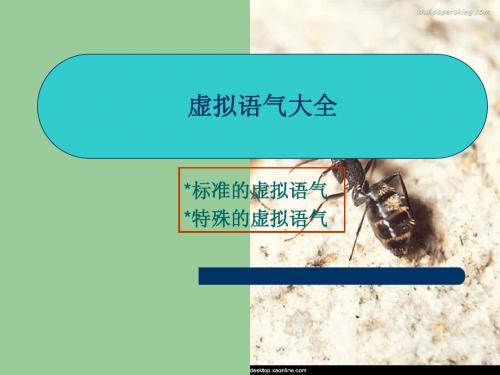虚拟语气
- 格式:ppt
- 大小:1.29 MB
- 文档页数:26

虚拟语气的常见用法和形式虚拟语气是用来表达非真实、未实现或假设情况的一种语法形式。
在中文和英语中都存在虚拟语气,但在两种语言中的使用方式和形式略有不同。
本文将介绍虚拟语气在英语中的常见用法和形式。
一、陈述虚拟语气1. 表达过去的虚拟虚拟语气的过去形式常用于表示与现实情况相反的假设或可能性,常用动词包括"be"、"have"、"were"等。
例如:- If I were you, I would apologize to her.- I wish I had studied harder for the exam.2. 表达现在的虚拟现在虚拟语气用于表达与现实情况相反或不确定的假设,常用动词包括"be"、"suggest"、"recommend"等。
例如:- It's about time she got a promotion.- I suggest that he be more careful next time.3. 表达将来的虚拟将来虚拟语气用于表达与现实情况相反或不可能实现的假设,常用动词包括"should"、"were to"等。
例如:- If I should win the lottery, I would buy a big house.- If it were to rain, the event would be canceled.二、命令虚拟语气当表示一种命令、建议或要求时,常使用虚拟语气来显得客气或委婉。
例如:- I suggest that you arrive on time for the meeting.- It's important that he be there for the ceremony.三、愿望虚拟语气愿望虚拟语气用于表达对过去、现在或将来的愿望、期望或希望。

虚拟语气的用法及例子
虚拟语气是一种语法形式,用于表示非真实的情况或假设的情况。
虚拟语气常见于条件句、愿望句和建议句中。
1. 条件句中的虚拟语气
条件句中的虚拟语气用于表达假设、不可能实现或不符合事实的情况。
- 如果我会飞,我就飞到月球上去了。
- 如果我有更多的时间,我会多读书。
2. 愿望句中的虚拟语气
愿望句中的虚拟语气用于表达对现在或过去情况的不满、遗憾或希望。
- 要是我能去旅行,我就会去世界各地。
- 要是我早些知道这个消息,我就不会错过这个机会了。
3. 建议句中的虚拟语气
建议句中的虚拟语气用于表达对某种行动或情况的建议、要求或命令。
- 尽量少吃甜食,要不然你会发胖的。
- 要是你需要帮助,尽管告诉我。
虚拟语气通过使用虚拟动词和特殊的句子结构来表达。
在中文中,通常使用“如果……就……”、“要是……就……”、“如果能……就……”等句式来表示虚拟语气。
需要注意的是,虚拟语气在口语和书面语中的使用有所不同。
在口语中,虚拟语气的使用相对较少,而在正式的书面语或文学作品中,虚拟语气的使用相对较多。
希望本文对你理解和运用虚拟语气有所帮助!。




虚拟语气八种虚拟结构:1、在含有表建议、命令、要求、请求、决定、义务等语气的句中借助should(可省略)使用虚拟语气。
1) 动词后的宾语从句2) 名词后的表语从句3) 名词后的同位语从句4) it +be +v-ed that 后的从句5) It +be +形容词+ that后的从句• she suggested that we (should) set off early the next day•My advice is that more trees should be planted in our school.•They won’t accept the suggestion that we should cut all the trees.•It is ordered that all the troops (should) withdraw three miles away.•It is essential(绝对必要的)that he ( should ) your home work first.常见用虚拟语气的词语:1)动词:command, demand, desire(希望), insis t(坚持), order, propose(提议), recommend (推荐), request(要求), require(要求), sugges t(建议)2). 分词:It is proposed that …(人们建议……) It is desired that … (最好、需要……) ,It is requested that … (人们要求……)It is suggested that … (有人建议……) ,It is recommended that …(有人推荐……)It is demanded that …(根据要求……) ,It is decided that …(已经决定……)It is arranged that … (已经安排……) 等等。
虚拟语气一、虚语语气表示说话人的一种愿望、建议、命令、要求。
有时是一种非真实的假设、料想,或是不可能实现的与事实相反的愿望。
二、虚拟语气的种类1. if引导的虚拟条件句(退一步,海阔天空)(1)与现在相反If + did (were), wmcs + do①如果我是你,我会再试一次。
If I were you, I would try it again.②如果我有一百万美元,我会买下这架飞机。
If I had one million dollars, I would buy the plane.(2)与过去相反If +had done sth, wmcs + have done①如果他努力学的话,他就会通过考试。
If he had worked hard, he would have passed theexamination.②要是当时我和她结了婚的话,那我是很不幸的。
If I had married her, I would have been unhappy.(3)与将来相反If + didwere to do , wmcs + doshould do译:如果他明天来的话,我会告诉他.If he were to come here tomorrow, I would tell him.练一练:①If you __________tomorrow, you _________ find the new manager working in the office.A. should come; wouldB. would come; wouldC. will come; shouldD. comes; might②If the parents ______at the hospital earlier after the accident, the child would have been saved.A. arrivesB. arriveC. had arrivedD. has arrived③---If he ________; he ________that food.---Luckily he was sent to the hospital immediately.A. was warned; would not have takenB. had been warned; would not have takenC. would be warned; had not takenD. would have been warned; had not taken 2. 虚拟句易考点(1)省略if,倒装的条件句:如果从句中有were, had, should时, 可把从句倒装①If I were you, I would try it again.→Were I you, I would try it again.②If he had been there yesterday, he would have seen thefilm.→Had he been there yesterday, he would have seen thefilm.③If it should snow tomorrow, we wouldn’t go out.→Shou ld it snow tomorrow, we wouldn’t go out.练一练①_________the exam, he would have attend a college.A. If he passedB. Had he passedC. Were he passedD. If he should pass②_______five minutes earlier, you could have seenthem off.A. If you should arriveB. If you arriveC. Had you arrivedD. Should you arrive③________it rain tomorrow, we should have to putoff the visit to the Science Museum.A. WereB. shouldC. wouldD. will(2)wish did/were 现在If only had done 过去as if wmc do 将来①我要是记得地址就好了。
虚拟语气英语知识点总结一、虚拟语气的概念。
虚拟语气是一种特殊的动词形式,用来表示说话人所说的话不是一个事实,而是一种假设、愿望、怀疑、猜测或建议等。
二、虚拟语气在条件句中的用法。
1. 与现在事实相反的虚拟条件句。
- 结构:从句(If + 主语+ 动词的过去式(be动词一般用were)),主句(主语+ would/should/could/might+动词原形)。
- 例如:If I were you, I would study harder.(如果我是你,我会更努力学习。
实际上我不是你)2. 与过去事实相反的虚拟条件句。
- 结构:从句(If+主语+had+过去分词),主句(主语+would/should/could/might + have+过去分词)。
- 例如:If he had taken my advice, he would have passed the exam.(如果他听了我的建议,他就会通过考试了。
实际上他没听建议,也没通过考试)3. 与将来事实相反的虚拟条件句。
- 结构:从句(If+主语+动词的过去式/should+动词原形/were to+动词原形),主句(主语+would/should/could/might+动词原形)。
- 例如:If it rained tomorrow, we would stay at home.(如果明天下雨,我们就会待在家里。
明天是否下雨还不确定,但这是一种假设情况)- 或者If he should come tomorrow, I would tell him the news.(如果他明天来,我就会告诉他这个消息)- 以及If I were to see her tomorrow, I would give her the book.(如果我明天见到她,我就会把书给她)三、虚拟语气在宾语从句中的用法。
1. wish后的宾语从句。
- 表示与现在事实相反的愿望,从句谓语动词用过去式(be动词用were)。